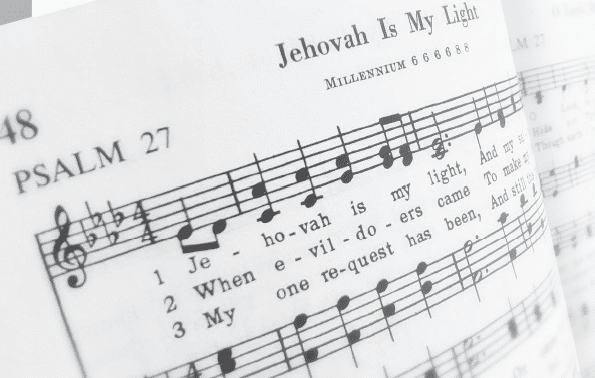November 3, 2011. It is day three of three. The room is dark. The west-facing windows pull hard to draw in the first rays of morning light. The aroma of fresh coffee fills the room. The only hint that the early morning hostess has already been there is the baking she has set out to greet the soon-to-arrive representatives. The door creaks open and the room begins to awaken. The artificial light replaces the strained daylight and reveals tables piled with books, binders, and candy wrappers. The room comes alive with laptop computers, Bibles, and an ambition to be productive once more on this third day.

Their goal for today? To make it through Psalm 100. Their goal for the future? To produce a psalter-hymnal that will be used in the praise and worship of God for generations to come. Their goal for this morning? To find psalm songs that most accurately reflects the text of Scriptures.
One committee member opens the day with Scripture and a prayer for God’s leading, direction, and blessing on the day’s work. Day three progresses. They forge ahead, examining psalm song sources from around the Reformed and Presbyterian world. Psalms 95, 96, 97, 98, 99.
Psalm 100. Come, be a fly on the wall and observe the process of the URCNA Psalter Hymnal Committee as they diligently work to choose psalm songs for a new psalter-hymnal.
Turn in your Bibles to Psalm 100. Compare the NKJV, the NIV, and the ESV texts. Now, open your Blue Psalter Hymnal to #195, compare the 1912 Psalter, the Scottish and New Zeeland Psalters, the Book of Praise, along with any other Psalm sources that may be piled high on the table. Also, examine the Psalm selections recently chosen by the Orthodox Presbyterian Church as found on their website. Which of these many summaries of this Psalm most closely represent the text of the Holy Bible? Not just words are examined, but which tunes best reflect the tenor and text of the Psalm. Which Psalm songs in our past are dearly loved and should be retained? Which are rarely sung and could be replaced? The committee members’ discussion proceeds orderly around the table. The songs are played. The songs are sung.
Songs for consideration are written on the white board. Alternate tunes are examined. Back to the piano. More singing, another go around the table. One by one the list is whittled down. It is down to two. What has been chosen for Psalm 100? Is old Blue still on the short list? Is Blue PH #195 well loved, used often, or has something closer to the text of Scripture been found? For such a well-loved and often-memorized Psalm, should it have two songs to represent it?
Take a look and sing along with the first of the two songs: From the psalm book “Sing Psalms” from the Free Church of Scotland, 2003, is found the following text paired with the tune Diademata (a.k.a. Crown Him with Many Crowns). Join your voice in song:
Shout to the LORD with joy, all who to earth belong. Adore the LORD with joyful hearts and come to him in song. Know that the LORD is God; he made us as his own. We are the sheep for whom he cares—his people, his alone. Enter his gates with praise, his courts with thankfulness. Your praises gladly sing to him; his name forever bless. For God the LORD is good; his love is ever sure. His constant truth and faithfulness through every age endure.
The Psalm song goal for the three-day meeting is met. The committee breaks for a delicious, hot homemade lunch prepared by the unseen hostesses. The table is festively decorated in fall attire. Words of encouragement are there to spur the committee onward in their seemingly unending task.
After this brief respite and refreshment they return back to the table, now spread with communications from all seven classes from the URCNA. It’s time to devote the rest of the day to work on the Hymn Proposal. Communications from the churches are read, heard, listened to, and applied. Deletions, additions, and modifications to the hymn section of the proposed hymnal are begun. This is a work in progress. And that work continues.
Daylight dims. The west-facing windows easily absorb the sinking rays of the sun. Tables are cleared, discussions have ceased; ahead is an eight-hour drive home for some, and for others, an 8:00 PM flight to catch. The room is again dark and quiet till we meet again. April 2012 D.V.
The Psalter Hymnal committee of the URCNA consists of one representative from each of the seven URCNA classes. They meet twice a year for a three-day face-to-face meeting and also monthly via Skype (computer) meetings.
Mrs. Denise Marcusse is a member of Faith United Reformed Church in Holland, MI, and a member on the Psalter Hymnal Committee, representing Classis Michigan. She is also an accompanist and choir director at her church.
